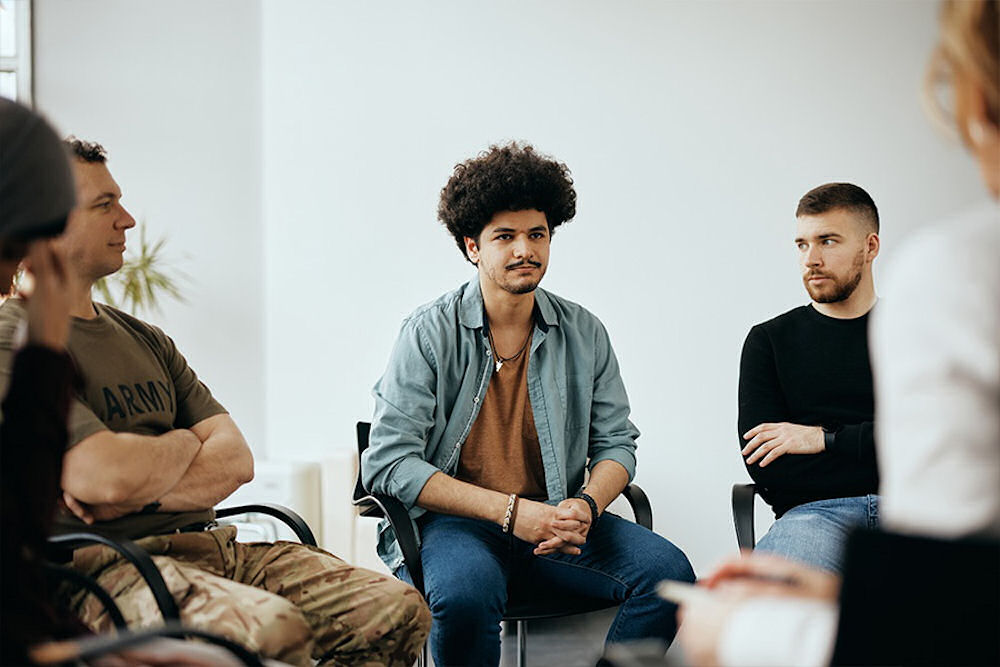Skill development is an essential part of the recovery process for addiction treatment. Through group therapy sessions, skills development can be incredibly beneficial to all participants. Individuals are able to give and receive feedback as well as learn new coping strategies and techniques from others like them.
Through this process, individuals are taking more active participation in their ability to understand addiction and mental health symptoms as well as developing the tools necessary to manage their disorders. Skill development is an essential part of all drug and alcohol addiction programs as well as in managing a mental illness.
What is Skills Development Group Therapy for Substance Abuse?
Jump to Section
Skills development group therapy is an evidence-based approach to addiction treatment that helps individuals learn and practice new skills to manage their substance misuse. It focuses on teaching coping strategies, problem-solving techniques, and life skills that can help better manage cravings and prevent relapse.
During skills development group therapy sessions, individuals are encouraged to share their experiences with addiction as well as discuss the issues that may have led them to use drugs or alcohol in the first place. With the guidance of a trained therapist, participants work together to identify triggers and develop effective strategies for dealing with them, such as healthy alternatives to substance use.
In addition, group members are taught how to recognize early warning signs of relapse, cultivate healthier relationships with others and develop self-care practices that can promote long-term recovery. Skills development group therapy also serves as a form of peer support, offering individuals encouragement and moral support during difficult times.
What are Some Therapeutic Factors in Group Therapy?
Some of the key therapeutic factors in group therapy include:
- Mutual support
- Interpersonal learning
- Catharsis
- Self-disclosure
- Instillation of hope
- Guidance from an experienced therapist
- Development of trust and self-esteem
- Confrontation
- Identity exploration
- Role-playing
Group therapy is a therapeutic approach that involves working with a group of individuals to help them address issues and make positive changes. It can be used to treat a variety of mental health disorders, including substance abuse and addiction. When conducted properly, group therapy can provide numerous therapeutic benefits for participants.
Mutual support involves members helping one another by offering advice and providing emotional support based on their shared experiences in recovery. Through interpersonal learning, individuals are able to learn from each other’s perspectives and gain new insight into how they interact with others within different contexts.
Catharsis occurs when members express emotions they had previously been unable or unwilling to share or confront. Self-disclosure encourages honesty among all members as they open up about their feelings, thoughts, and experiences related to their disorder or addiction.
The instillation of hope allows members to break free from feelings of despair and replaces them with the optimism needed for successful recovery. Lastly, guidance from an experienced therapist provides an opportunity for individual reflection as well as for developing coping strategies tailored specifically to the needs of each participant.
What is the History of Group Therapy?
Group therapy is a form of psychotherapy that involves working with a group of individuals to address issues and foster positive changes. It has been used in mental health treatment since the early 20th century, when it was first introduced as an alternative to traditional one-on-one counseling sessions.
The origins of modern-day group therapy can be traced back to the 1920s when Canadian psychiatrist William B. Walsh applied the theory of Gestalt psychology, which focused on whole rather than individual experiences for therapeutic treatment. His work laid the groundwork for the development of other experiential therapies such as music therapy, art therapy, and drama therapy.
In the 1930s, the American Psychiatric Association officially recognized group psychotherapy and during World War II it was used to treat veterans returning from battle with emotional trauma. In the years following, group therapy began to gain wider acceptance among psychologists and psychiatrists as an effective means of treating mental health disorders.
Today, it remains an important tool for helping individuals facing addiction or struggling with depression, anxiety or another disorder overcome their obstacles and lead healthier fulfilling lives.
What are Some Beneficiaries of Skill Development Group Therapy?
Skill development group therapy is a type of therapy that focuses on assisting individuals in developing new skills and strategies to help them navigate their day-to-day lives. It is often used to treat those with mental health disorders such as anxiety, depression, substance use disorder, and post-traumatic stress disorder (PTSD).
The primary beneficiaries of skill development group therapy are those who are struggling with mental health issues or addiction and need help developing the skills necessary for recovery. By working with other members in a supportive environment, participants can gain insight into their own behaviors and find new ways of coping with stressful situations.
Other potential beneficiaries include those who have been diagnosed with developmental conditions like autism, as well as children and adolescents who have experienced trauma or abuse. Skill development group therapy can also help people develop social skills, improve communication, regulate emotions, and manage potentially unhealthy behaviors.
What are Some Techniques in Skill Development Group Therapy?
Skill development group therapy often utilizes a range of techniques to help participants develop the tools needed to make positive changes. These techniques can vary depending on the type of therapy, but may include cognitive behavioral techniques (CBT), solution-focused strategies, mindfulness exercises, psychoeducation, and other holistic activities.
Cognitive Behavioral Therapy Techniques
Cognitive Behavioral Techniques (CBT) involve challenging unhelpful thought patterns and behaviors in order to replace them with healthier alternatives. This technique helps individuals identify negative beliefs and emotions that may be causing problems and teaches them how to modify or replace these thoughts with more positive ones.
Solution-Focused Therapy
Solution-focused therapies focus on the present and future rather than dwelling on the past. This approach helps participants develop goals for their future and establish a plan of action for achieving those goals. Solution-based techniques often involve structured activities such as brainstorming, creating action plans, and providing feedback. During these activities, facilitators may ask questions to help individuals identify their strengths, develop self-awareness and explore potential options for making positive change. Through this process, the entire group can benefit from each other’s insights and support one another in their journey toward recovery.
Mindfulness or Meditation
Mindfulness exercises are designed to help individuals remain present in the moment as opposed to stressing about things outside their control. These activities can help to reduce stress, anxiety, and negative emotions while also promoting physical and mental well-being. Examples of mindfulness activities include mindful breathing, body scanning, guided meditation, yoga stretching, journaling, and visualization.
Psychoeducation
Psychoeducation provides participants with information about different issues related to mental health disorders and addiction-related behaviors. During psychoeducation sessions, topics such as risk factors, triggers, cravings, and relapse prevention are discussed. Additionally, techniques like relaxation skills, positive self-talk, and goal setting may be implemented to help participants become more mindful of their thought patterns and behaviors.
Holistic or Experiential Therapy
Experiential activities can also be used such as art therapy or role-playing which can help individuals become aware of their feelings and reactions in various situations. These techniques are used to help individuals develop self-awareness, identify their feelings and gain insight into the underlying causes of their addictive behavior. Examples of experiential therapy techniques used in group therapy for addiction include role-playing, art/music therapy, movement/dance, psychodrama, and breathing exercises.
What are Some Strengths of Skills Development Group Therapy in Treatment?
Skill development group therapy is an effective treatment for a range of mental health issues and can provide individuals with the tools they need to make positive changes in their lives. One of the primary strengths of this type of treatment is that it takes place within a supportive environment with other participants who have similar goals, which helps to motivate and encourage people throughout their journey.
In addition, skill development group therapy provides individuals with the opportunity to learn skills that are transferable outside of the therapeutic setting. Participants learn how to communicate more effectively, manage their emotions, practice self-care, and develop strategies for dealing with stress. This type of therapy also allows participants to give and receive feedback from each other and formulate new perspectives on situations or challenges they might be facing.
Overall, skill development group therapy has been proven effective in helping individuals make lasting changes in their lives by equipping them with the tools needed to overcome anxiety, depression, trauma, and more.
What are Some Conflicts of Skills Development Group Therapy in Treatment?
One common conflict is that of individual versus group goals; sometimes participants may have difficulty balancing the needs of the group with their own personal objectives. Although skill development group therapy is a very effective treatment option, there are some potential conflicts that can arise.
Group dynamics can also be tricky and tensions can arise between members as they learn to work together to accomplish their goals. Another issue may be a lack of structure or organization which can lead to confusion and frustration among members. And finally, if not managed correctly, participants may become fixated on certain negative aspects instead of focusing on positive changes.
Overall, skill development group therapy has the potential to create some conflicts if not properly facilitated. However, if managed correctly it can become a powerful tool for making lasting changes in individuals’ lives. Therapists and addiction treatment specialists that utilize skills development in group therapy recognize these potential conflicts and manage groups effectively to minimize any issues.
Are You Interested in Learning More About Group Therapy and Skills Development?
Skills development group therapy is an effective way to help overcome issues in substance abuse treatment. This form of therapy helps individuals develop necessary coping skills and relapse prevention plans that will help them stay focused on recovery after treatment has ended.
To learn more about skills development group therapy and other ways that you can overcome substance use disorder, contact Free by the Sea today! We can help you find life-long recovery from addiction and mental health disorders.

Dr. Richard Crabbe joined our team in 2019 as our psychiatrist and medical director. He attended the University of Ghana Medical School where he became a Medical Doctor in 1977. From 1978 through 1984, he was a medical officer in the Ghana Navy and provided a variety of services from general medicine to surgeries. He received his Certificate in General Psychology from the American Board of Psychology and Neurology in 2002.







